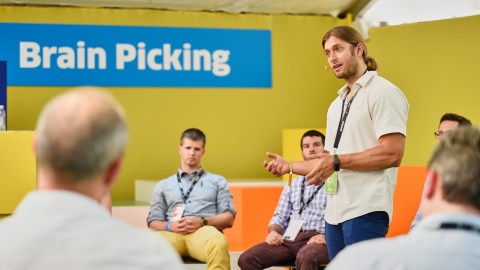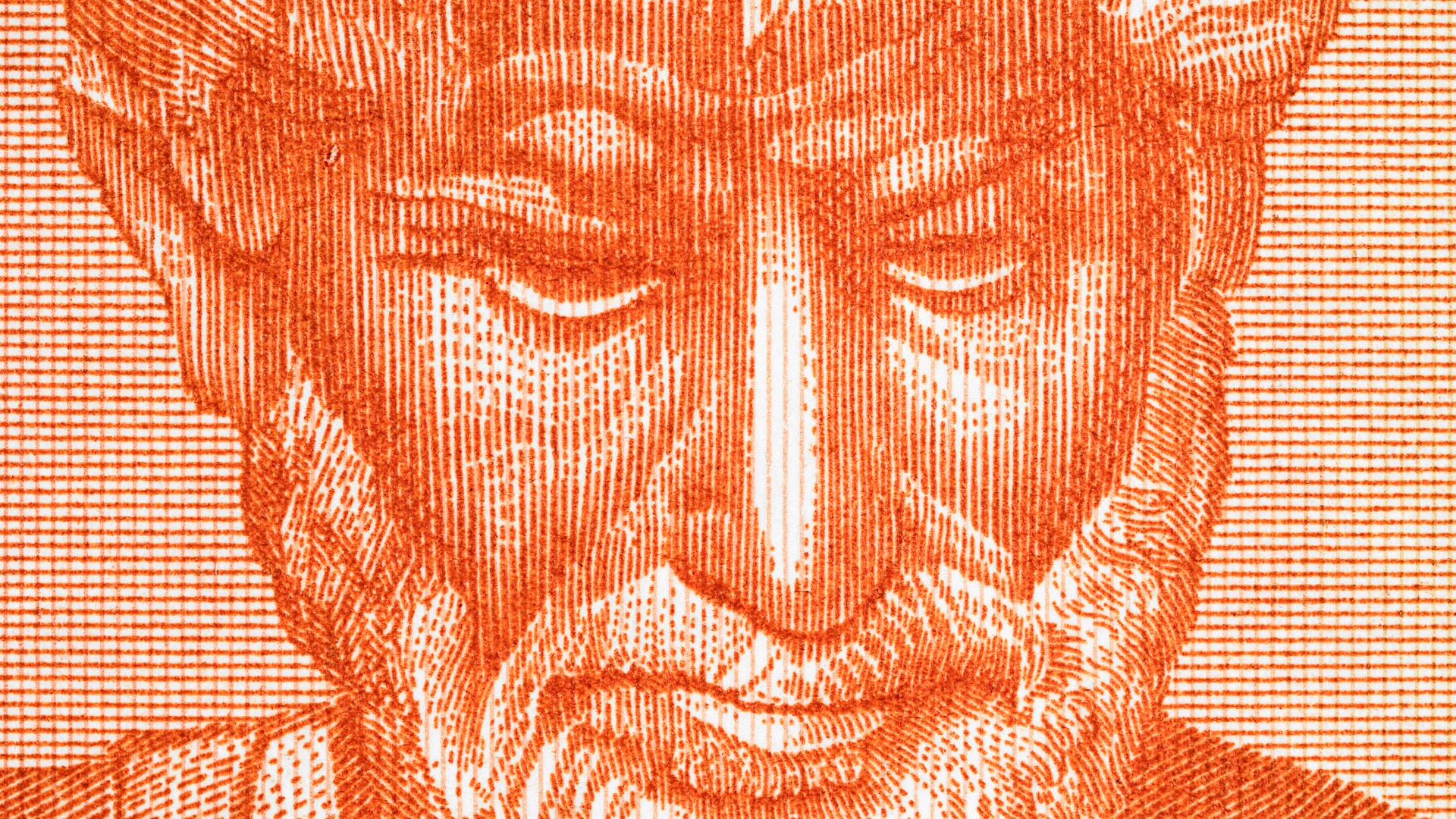What makes for an excellent human life?

Andrew Taggart is a practical philosopher who teaches people how to lead “the most excellent human life.”
He has appeared at TEDx and BrainBar and Big Think discussing the future of work, or rather why he believes that jobs are awful and humans have become enslaved in a system of “total work” where work has become the center around which the world turns.
When we talk about his utopian version of the world, he adds romantic love to the list of things that have vanished and imagines leisure and sabbath at the center of that utopia—the only ways through which we could begin to examine life and find its deeper meaning.
What is “the excellent human life”?
That remains to be investigated, but certainly, it at least needs to accept one basic condition: that it is open and available to examination. This was Socrates’ breakthrough when he said that the unexamined life is not worth living. He meant that something happens when you begin to take your life as the fundamental question, the one that you care the most about. Not the world itself, not other people, but rather when you turn the question back on yourself and ask, ‘Who am I? Why am I here? What is this all about?’ you are beginning the process of deepening, extending and enriching your life.
Is that an intellectual pursuit or an experiential one? For example, should we be juxtaposing philosophy and meditation?
I think that philosophy begins with a convulsive experience; experience that shakes you out of your own certainties, out of your way of being in the world. Philosophy comes to the scene to illuminate that convulsive experience, it is not a merely intellectual affair. It’s rather what I would call existential. Let’s take death for example. Death can be considered abstractly and theoretically alone but that is not interesting or philosophical. Death can also be just considered deeply personally, but that’s not quite enough either. Philosophy occurs at the very moment when I am gripped personally, emotionally, by something but I can also grasp that it transcends me.
I don’t think that philosophy and meditation have to be separated too far. When I philosophize with people, we usually meditate before that. The philosophizing itself is in the realm of part meditation; we are very careful and considerate when it comes to looking very closely and honestly at our own thoughts as they arise. So, if you take my starting point that philosophy begins with our own wrenching experiences, whether they be joy or sorrow, and my further point that philosophy is a way of illuminating these experiences and to enable us to find our place in the world, then meditation is simply in assistance of philosophy or even vice versa as both are practices of deep examination.
Could you share some of your personal journey in discovering both philosophy and meditation?
It begins with a shattering experience. I didn’t really come to philosophy until the age of 29. At that time I deposited my Ph.D. dissertation and I realized that I was not going to continue with an academic career. I realized I was not really cut out for it and what I cared about, it seemed, went well beyond the scope of what a humanistic endeavor could offer. And that was quite devastating because I had done nothing else with my life until then. I had been following a life script. I had been living an unexamined life, a life of an automaton—a life involving sleepwalking. So, for the first time in my life I began asking, very poorly and clumsily, questions about who I am, why I am here, what this is all about.
I woke up to mediation also through happenstance. My wife and I meditated for probably ten minutes with our eyes closed, we were holding hands, so it was not the most classic type of meditation. Afterward, we ended up walking in Central Park and then something interesting happened. It was as if the world was radically altered; it was beautiful beyond words and wonderful beyond words. There was complete non-judgementality in this experience. After that experience, I asked myself could this be what it’s really like to be a mortal, this clear perception of reality? So I thought there is something about meditation and I better start doing that.
You coach people; how do you help them start on this path? What are the first steps they should take?
There is a line from the gospel in which Jesus says he is speaking to those who have ears to hear. It says something about the human spirit. What he is getting at, I think, is that you need to be around people who have begun to have one of those eye-opening experiences. And I don’t mean to overplay them, it can be a minor experience. Once “that” has happened, whatever “that” may be, people already have ears to hear.
This is why philosophy is elitist. It is egalitarian in the sense that it is possible for everyone to philosophize, anyone can ask, “Who am I?”, but it is elitist in the sense that only certain people are comfortable to do so. For various reasons—some are older, some are younger, they have certain academic backgrounds. It is usually helpful not to have an academic background, because it gets in the way of a lot of things, it’s mental clutter. But once you’re around people who get it intuitively, then you don’t have any explaining to do.
In your work, you talk about the “restlessness of spirit”. How do you describe it? What is the cause of it?
There are two sources: one is existential anxiety. It is an anxiety about your own death, anxiety about something else that is non-activity, other than human activity, that is, I think, running the show—something of Dao, a form of life that is involved in the movement and interactions of the world. We want to forget that. We want to believe that we are the ones who are in control of our lives.
The second one, relatedly, is total work. This is the way in which I take myself to be a worker, but also the one who is the CEO of my life, the CEO of life in general. Once I think I am the CEO of everything and I also have existential anxiety to cover up, then I have an engine force that continues to make me want to do stuff.
From a Buddhist point of view, you are afflicted because you have attractions and aversions. We are going to be restless because we can’t find stillness, or rest, or being-ness, or presence until we continue to long for what is not here or seek to get rid of what is here. So, that is a third part of the story.
We can dig a little bit deeper and ask why are we so restless when it comes to attractions and aversions. From the Buddhist point of view, the answer is pretty simple: we think there is a “self” running the show. You should really take a long look at this, see whether you find anything that answers to that core sense of self. If you don’t find anything, life is going to change pretty dramatically from that point on.
Everybody is talking about the future of work. If you are to imagine a radical new future in a positive way, what does that society look like?
In my utopia, there are no jobs because I think that jobs are awful. They are part of your subjugation; you have to exchange your freedom and autonomy to enter into a contractual employer-employee relationship. Jobs are gone in my utopia, but I am not an anarchist claiming that we should reject all forms of work. I think that someone making dinner for someone else is a beautiful thing and is also work. I would hate for all those experiences to be replaced, for example by A.I. There will be humane forms of work, face-to-face forms of work: caring for someone, gardening, carpentry.
But, in my utopia, the center of life would be leisure and sabbath. I take leisure to be something a bit odd. Leisure is not free time. Leisure is the condition of possibility for apprehension of reality. Leisure is what enables people to apprehend. We will have to develop practices, rituals and even institutionalize the ways in which leisure will be celebrated.
And then there will be something called sabbath or whatever you want to call it. And the sabbath will be the center of life. It is not just another day of the week in the succession of other days. It is a day of rest but it is not a day of inertness. It is resting into why we are here. The center of the week is a way of tapping into the source of life.
What would stop us from using this leisure time for an endless pursuit of pleasure instead of for contemplation?
Nothing, in principle. Nothing is going to stop some people from doing so. But too bad for them. They have missed out on what life is about. If you have a universal condition there will always be people who would want to opt out.
My utopia would have to criticize a few other things as well: the working society, pleasure, sports, and romantic, sentimental love. The problem with sentimental love, for example, is that it doesn’t allow for other experiences of love—brotherly love, love of thy neighbor—it closes you off through a kind of possessiveness and a belief that that particular love, however important it is, is so special that you can’t possibly spread your love elsewhere. I’d like to think that love is like compassion and it should be spread. Romantic love is possessive, it is privatizing, it closes off the way the heart can be opened to all sorts of people.
You say that we also need religious worship. Why is that?
There are very few people who are genuine scientists who would speak earnestly and say that science would give you a reason for living. It provides accurate descriptions of a particular level of reality—physical reality, perhaps even social reality—but at the end of all that, after you have carried out all the analysis, you still don’t have a reason for living. You still can’t answer the question, “Why bother not killing myself?”. And that is a genuine question. So, you need to go to other forms of inquiry, other practices, other domains in order to find answers to such questions. Or to put it somewhat differently, the intellect asks questions that only the heart can answer.
——-
More of Andrew Taggart’s thoughts can be found on his website.
BrainBar is Europe’s leading festival on the future where “the bravest and edgiest thinkers of our time” meet every year to discuss the most exciting and controversial topics shaping our future.





